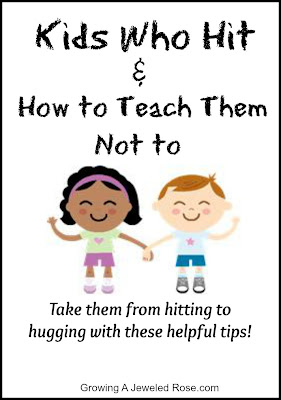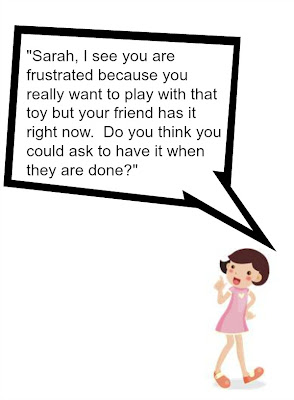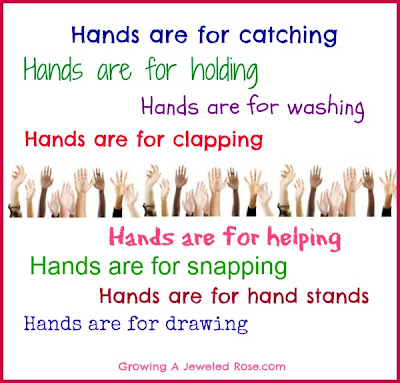Rosie was recently going through a hitting stage. I had tried time out as well as discussing with her why we do not hit our friends but it wasn't helping at all. So, I turned to my readers and asked them for suggestions. The informational tips shared on the Growing A Jeweled Rose facebook page were so helpful I wanted to compile them here so that they could act as a resource for parents, teachers, and anyone else who might be battling the same problem with a kid who hits.
Take them from hitting to hugging with these helpful tips:
~ Several readers recommended the book, Hands Are Not for Hitting by Martine Agassi. This book talks
by Martine Agassi. This book talks
about all the fun things we can do with our hands and why using them for
hitting is never ok. It is beautifully illustrated. We ordered it soon after it was recommended to
me, and it has helped Rosie a lot. Besides that, she really enjoys the book.
about all the fun things we can do with our hands and why using them for
hitting is never ok. It is beautifully illustrated. We ordered it soon after it was recommended to
me, and it has helped Rosie a lot. Besides that, she really enjoys the book.
~ Another suggestion was to remove them from the situation and have them sit away from the group- once
little ones are pulled away from the source of their hitting and see that they are not
having fun like the other children, they often come to realize they made a bad choice. Before allowing
them to go back and join the fun talk to them about hitting and encourage them to apologize.
~ When removing them from the situation doesn't work, you may need to abruptly end a play
date. While I did not love this suggestion because play dates are for me just as much as Rosie, there
was one day where this became necessary. Rosie had several warnings and was put in time out and still
went right back and hit her friend. So, to show her that hitting would absolutely not be
tolerated, we left. Just as readers suggested, it only took one time for Rosie to have to leave a play
date before she learned that if she wants to play with her friends she has to be nice to them. Since that
day, if I warn her about hitting and tell her we will leave if she does it again, she stops. Cutting the play
date short just that one time taught Rosie that mommy will follow through. Great tip!
~ Be mindful of their triggers so that you might see the frustration that
leads to hitting and intervene before it happens. Step in and try using positive dialogue to diffuse
the situation.
This helps let the child know that there are other ways of approaching the situation and reminds them to
use their words. It also lets them know that you understand their feelings. Sometimes knowing someone
understands is enough to calm those feelings down. Giving them another way to express their desire for
the toy shows them they do not have to hit to get what they want.
~ Try to stay calm- when an upset and angry child is met with an angry parent it typically makes
the child that much more upset. Try to stay calm in order to help your child through the situation. Most
of a child's hitting comes from a lack of knowing how to work through
their feelings. Set a good example by showing them that even when you are upset you are able to
talk and behave rationally.
~ Another thing mentioned was the use of positive examples that illustrate
what hands are for. This method both redirects the child and makes them want to use their
hands for fun things. When you see your child hit another, go over and say:
"No, we do not hit with our hands. We want to use our hands for fun. Hands are for clapping.
Hands are for waving. Can you show me what other fun things you can do with your hands?"
What fun things are your hands used for?
This directs the child away from the trigger of the hitting and pulls them to a positive and happy place, all without them even realizing you are doing so.
~ Use the times when your child is the victim of hitting as a teaching tool.
Your child is bound to get hit by his peers every once in a while. The hitting stage is something
that most children do go through after all. Use those times when your child has been hit to teach him that
hitting is not ok. Ask your child how they felt when they got hit. Build their sympathy and
compassion. When they say that it hurt or that they did not like it remind them that that is why we do
not hit. Then, the next time they hit a friend, remind them of that discussion.
"Remember when Scott hit you? You didn't like it, did you? Hitting hurts, and it is not ok. It is not
ok for you to hit anyone, and it is not ok for anyone to hit you."
~~~~~~~~~~~~~~~~~~~~~~~~~~~~~~~~~~~~~~~~~
Thanks so much to the readers who shared these tips with me! All of these tips have been very helpful for Rosie! She seems to be coming out of the hitting stage but still has days where some of these suggestions need to be implemented. We still read the book often as well. If you are struggling with a child who hits, I hope you find these tips and resources helpful.
Do you have any other helpful tips to share on this topic? I would love to hear how you helped your child learn not to hit. Please do share your tips with us in the comments below.



No comments:
Post a Comment